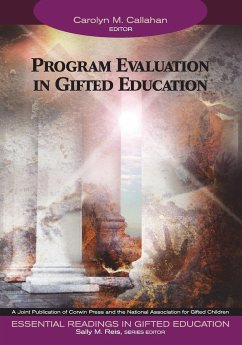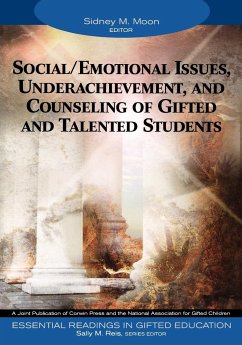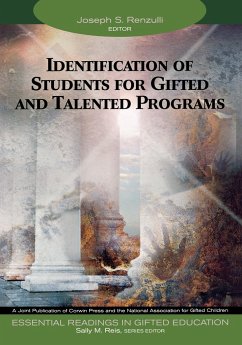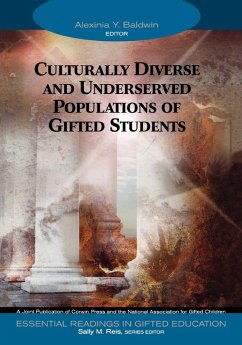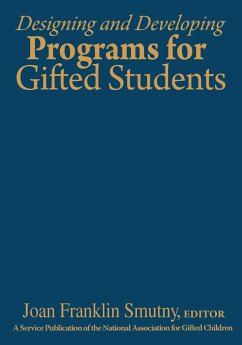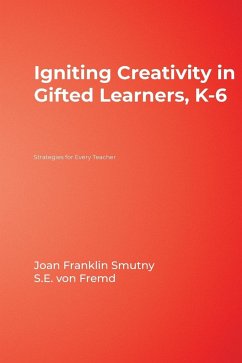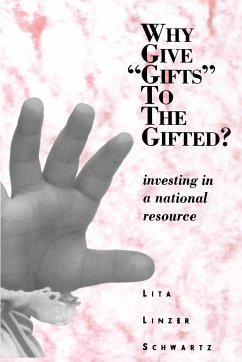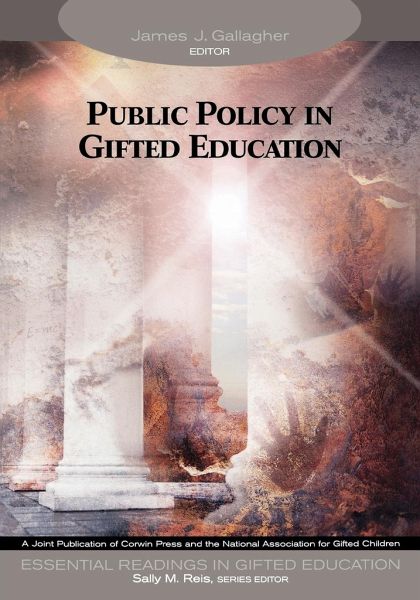
James John Gallagher
Broschiertes Buch
Public Policy in Gifted Education
Versandkostenfrei!
Versandfertig in 1-2 Wochen

PAYBACK Punkte
17 °P sammeln!




Please update Sage UK and Sage INDIA addresses on imprint page.
James J. Gallagher is a senior investigator at the Frank Porter Graham Child Development Institute at the University of North Carolina at Chapel Hill. He has worked in the field of education of exceptional children for over 40 years. Dr. Gallagher has served as the president of the World Council for Gifted and Talented, president of the Council for Exceptional Children (CEC), and is past president of the National Association for Gifted Children (NAGC). In addition, he is coauthor of a leading textbook, Educating Exceptional Children, with Samuel Kirk and Nick Anastasiow, and coauthor with his daughter, Dr. Shelagh Gallagher, of the book Teaching the Gifted Child. Sally M. Reis is a professor and the department head of the Educational Psychology Department at the University of Connecticut where she also serves as principal investigator of the National Research Center on the Gifted and Talented. She was a teacher for 15 years, 11 of which were spent working with gifted students on the elementary, junior high, and high school levels. She has authored more than 130 articles, 9 books, 40 book chapters, and numerous monographs and technical reports. Her research interests are related to special populations of gifted and tal-ented students, including: students with learning disabilities, gifted females and diverse groups of talented students. She is also interested in extensions of the Schoolwide Enrichment Model for both gifted and talented students and as a way to expand offerings and provide general enrichment to identify talents and potentials in students who have not been previously identified as gifted. She has traveled extensively conducting workshops and providing profes-sional development for school districts on gifted education, enrichment programs, and talent development programs. She is co-author of The Schoolwide Enrichment Model, The Secondary Triad Model, Dilemmas in Talent Development in the Middle Years, and a book published in 1998 about women's talent development titled Work Left Undone: Choices and Compromises of Talented Females. Sally serves on several editorial boards, including the Gifted Child Quarterly, and is a past president of the National Association for Gifted Children.
Produktdetails
- Verlag: Corwin
- Seitenzahl: 212
- Erscheinungstermin: 1. März 2004
- Englisch
- Abmessung: 254mm x 178mm x 12mm
- Gewicht: 409g
- ISBN-13: 9781412904377
- ISBN-10: 1412904374
- Artikelnr.: 22274015
Herstellerkennzeichnung
Libri GmbH
Europaallee 1
36244 Bad Hersfeld
gpsr@libri.de
Für dieses Produkt wurde noch keine Bewertung abgegeben. Wir würden uns sehr freuen, wenn du die erste Bewertung schreibst!
Eine Bewertung schreiben
Eine Bewertung schreiben
Andere Kunden interessierten sich für




